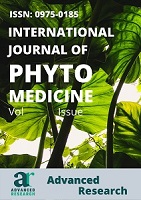Cytotoxicity Study in Non Malignant Fibroblast L929 Cell Line with Mucuna pruriens Seed Extract
Keywords:
Mucuna pruriens seeds, L-DOPA enriched extract, L929 cell line, ToxicityAbstract
Mucuna pruriens (L.) DC. (Leguminosae), commonly called velvet bean has been long used by tribes as an antidote for various snakebite, for treating depression and various nervous disorders, Parkinson's disease, arthritis and also has potent anti-urolithiatic, anti- diabetic, anti-cancer, anti-oxidant activities. To evaluate the potential cytotoxicity of the hydroalcoholic extract of Mucuna pruriens seeds in non-malignant fibroblast L929 cell line. To access the toxic nature of the seeds, a hydroalcoholic extract was prepared and tested for its cytotoxic effects on non-malignant fibroblast L929 cell line at various concentrations (1.25 mg/ml, 2.5 mg/ml and 5 mg/ml). Viability (%), cell death (%), cytotoxicity grading, proliferation rate and growth inhibition values were calculated. No substantial difference in viability (%), cell death (%), growth inhibition (%) and proliferation rate were observed either at 24 h or 48 h following treatment with various concentrations of the extract as compared to the negative control. No toxicity was observed at any concentration of the extract, implying that the L-DOPA enriched extract of Mucuna pruriens is not toxic to the non malignant cells. These results confirmed that Mucuna pruriens seeds are safe and can be used as medicine for the treatment of various diseases.
References
Suresh S, Prakash S. Effect of Mucuna pruriens (Linn.) on sexual behavior and sperm parameters in streptozotocin-induced diabetic male rat. J Sex Med 2012; 9: 3066-3078.
Manyam BV, Dhanasekaran M, Hare TA. Effect of antiparkinson drug HP-200 (Mucuna pruriens) on the central monoaminergic neurotransmitters. Phytother Res. 2004a; 18: 97-101.
Manyam BV, Dhanasekaran M, Hare TA Neuroprotective effects of the antiparkinson drug Mucuna pruriens. Phytother Res. 2004b; 18: 706-712.
Lieu CA, Kunselman AR, Manyam BV, Venkiteswaran K, Subramanian T. A water extract of Mucuna pruriens provides long-term amelioration of Parkinsonism with reduced risk for dyskinesias. Parkinsonism Relat Disord. 2010; 16: 458-65.
Katzenschlager R, Evans A, Manson A, Patsalos PN, Ratnaraj N, Watt H, Timmermann L, Van Der Giessen R, Lees AJ. Mucuna pruriens in Parkinson's disease: a double blind clinical and pharmacological study. J Neurol Neurosurg & Psychiatry. 2004; 75: 1672–1677.
Siddhuraju P, Becker K. Rapid reversed-phase high performance liquid chromatographic method for the quantification of L-DOPA (L-3,4-dihydroxyphenylalanine), non methylated and methylated tetrahydroisoquinoline compounds from Mucuna beans. Food Chem. 2001; 72: 389–394
Misra L, Wagner H. Alkaloidal constituents of Mucuna pruriens seeds. Phytochem. 2004; 65: 2565–2567.
Singh DC., Sahu PK, Pal A, Nanda G. Anticataleptic and antiepileptic activity of ethanolic extract of leaves of Mucuna pruriens: A study on role of dopaminergic system in epilepsy in albino rats. Ind J Pharmacol. 2011; 43: 197-199.
Vamsi S, Raviteja M, Siva Kumar G. In-vitro antiurolithiatic potential of various extracts of Mucuna pruriens. Int J Pharma Sci Res. 2014; 5: 3897-3902.
Rajeshwar V, Gupta M, Mazumder UK. In Vitro Lipid Peroxidation and Antimicrobial Activity of Mucuna pruriens Seeds. Iranian J Pharmacol Ther. 2005; 4: 32–35.
Agbafor KN, Nwachukwu N. Phytochemical analysis and antioxidant property of leaf extracts of Vitex doniana and Mucuna pruriens. Biochem Res Int. 2011; 2011:1-4.
Majekodunmi SO, Oyagbemi AA, Umukoro S, Odeku OA. Evaluation of the anti-diabetic properties of Mucuna pruriens seed extract. Asian Pac J Trop Med. 2011; 4: 632-636.
Tan NH, Fung SY, Sim, S M, Marinello E, Guerranti R, Aguiyi JC. The protective effect of Mucuna pruriens seeds against snake venom poisoning. J Ethnopharmacol. 2009; 123: 356–358.
Meenatchisundaram S, Michael A. Antitoxin activity of Mucuna pruriens aqueous extracts against Cobra and Krait venom by in vivo and in vitro methods. Int J PharmTech Res. 2010; 2: 870-874.
Vadivel V, Pugalenthi M. Removal of antinutritional/toxic substances and improvement in the protein digestibility of velvet bean seeds during various processing methods. J Food Sci Technol. 2008; 45: 242–246.



